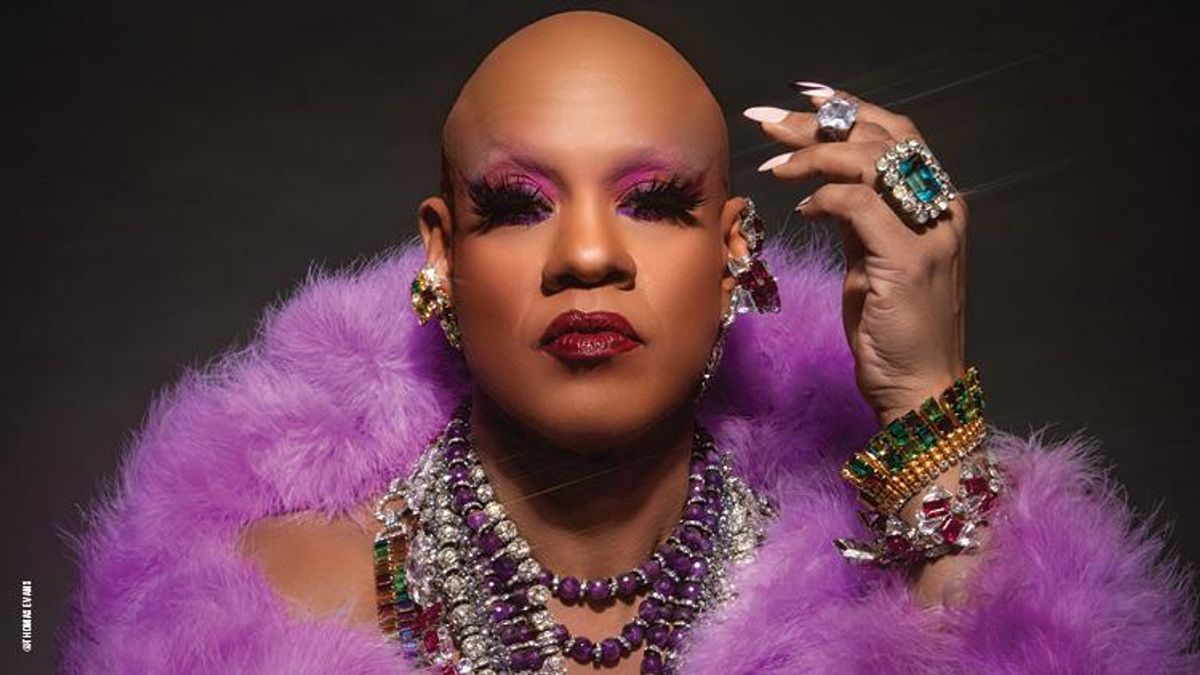"I feel like I'm back in the game again." And he is. Legendary nightlife staple and Billboard-charting dance artist Kevin Aviance has seen a resurgence this year in his public profile, and while that bump was undoubtedly expedited when Beyonce sampled one of his songs on her most recent album, Renaissance: ACT I, Aviance's star was already steadily on the rise, booking DJ gigs across North America. The artist made his name with hits like "Din Da Da" and "Give It Up" in the late '90s and early 2000s, had a line of women's heels in his name for two seasons, and was once named by Billboard as one of the most successful dance artists of all time. "I've never stopped working; I've been stopped," he says.
The self-described "Black queen" got his start at an early age. Born in Richmond, Va., as one of eight kids, he came into himself in the fourth grade. Set to compete in a talent show with his schoolmates, he chose to sing Gloria Gaynor's "I Will Survive." To complete the effect, his mom brought a bit of her Fashion Fair Cosmetics makeup to do his face.
"It wasn't about being a woman or anything," he says. "It was just me trying to make the package look prettier; my voice was very high at the time." Still, that kicked off a lifelong process of using drag as an art form and medium, and one of the first performances in a career that influenced his deep love of music.
Aviance moved from Virginia to Washington D.C., then Miami, and then to New York City. He joined the House of Aviance and changed his name, had a cameo in Madonna's "Secret" video, appeared in the historic Patrik-Ian Polk film PUNKS, and carved a career for himself as one of the few New York City queens who could make a living performing full-time. His songs like "Cunty," encapsulating a vibe of living in and feeling the fantasy, made crowds move, so much so that major artists like Cher called on him as their opening acts. While it did require a lot of tenacity and willpower, he was up for it.
"I remember one time I was performing at the Roxy, and they asked if I could get some white girls," he recalls, reflecting on a request to replace his Black backup dancers. "I said they are all white, they are just in dark makeup."
Aviance's roadmap as a performer came from an undying love for music. Grace Jones, Sylvester, and Boy George proved pivotal for the entertainer, although the list of influences is endless. Claiming to have seen more than 3,000 concerts from legends like Dolly Parton, Rick James, Janet Jackson, and Prince, it was the confluence of them all, and the addition of close collaborators like Caesar Galindo (whom he credits with helping him "find his Grace Jones" by encouraging him to shed the wigs and fake breasts he'd been wearing) that gave the world the one-of-a-kind figure that is Kevin Aviance. And it was from there the music came.

But in 2006, everything came to a shocking halt: Aviance was beaten by four men in a homophobic attack. It occurred during Pride month, and it made national headlines. At a rally six days after, despite his jaw wired shut, Aviance told the crowd, "You can't keep a good queen down." Shortly after that, he became an ambassador for the Human Rights Campaign, speaking out against violence.
Thinking his career was sunsetting, Aviance left New York City to deal with the trauma from his attack and check in with himself. But after surgery on his hips -- wrecked by years of high heels -- and having to sit with himself during COVID following the death of his best friend, trailblazing dance artist Ari Gold, things began to change. Aviance started a new career as a DJ.
"I just told myself you have nothing to lose and everything to gain," he says of the new path, which he practiced in his own home before picking up gigs first in New York City and Atlanta, then moving on to large-scale events like Montreal Pride. "It really has saved the essence of who I am," he says.
As this new career took off, Beyonce tapped Aviance's "Cunty" -- a quarter-century old, but still alive on the ballroom scene as a classic voguing track -- for her "PURE/HONEY" release.
"If this had happened to me a few years ago, I don't know that I would have been present. It's so overwhelming to feel like this. It feels so good to be verified and vindicated and to be heard," the 54-year-old reflects. He also notes that this ascent comes while other LGBTQ+ artists like Saucy Santana, Billy Porter, Big Freedia, Lil Nas X, and more are having monumental moments. "For [Bey] to hold up and embrace this Black boy joy and for her to give us our life like this ... we're sitting in our renaissance."
Photography by Thomas Evans
Stylist, Jamie Grace
Make-Up, Darvell Freeman
Photographer's assistant, Peter Froitzheim
This story is part of The Advocate's 2022 History issue, which is out on newsstands August 30. To get your own copy directly, support queer media and subscribe -- or download yours for Amazon, Kindle, Nook, or Apple News.













































































